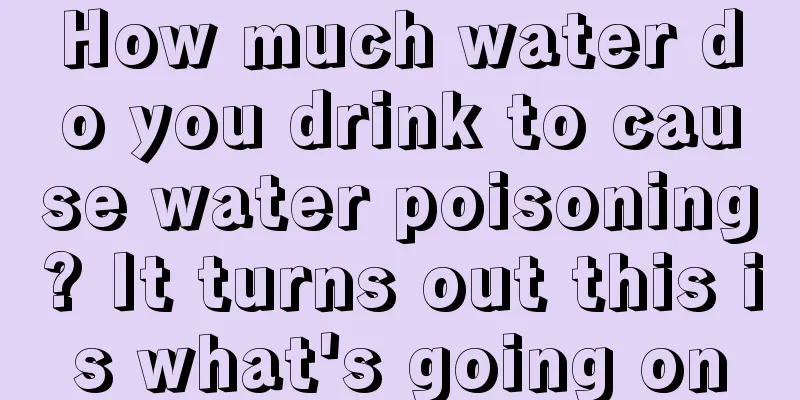How much water do you drink to cause water poisoning? It turns out this is what's going on

|
Elderly people often say, "If you want to be healthy, drink eight glasses of water a day." However, many health experts recently say that you should not drink too much water, as drinking too much will lead to water poisoning. So how much water will lead to water poisoning? In fact, water intoxication is not caused by drinking too much water. Water intoxication is actually caused by the speed of drinking water exceeding the diuresis speed of the human kidneys. "Water intoxication" occurs because the maximum sustained diuresis rate of the human kidneys is 16 ml per minute. Once the water intake rate exceeds this standard, the excess water will cause the cells to swell, causing dehydration and hyponatremia, which generally leads to symptoms such as dizziness, vomiting, weakness, and rapid heartbeat. In severe cases, convulsions, coma, and even life-threatening conditions may occur. Causes 1. Excessive secretion of antidiuretic hormone (ADH) It can be seen in fear, blood loss, shock, acute infection (such as pneumonia, toxic dysentery, etc.), use of analgesics (such as morphine, pethidine), or stress stimuli such as pain and surgery. Increased ADH secretion after surgery usually lasts for 12 to 36 hours, or longer. In this case, excessive intake of electrolyte-free solutions such as glucose can easily lead to water poisoning. In addition, patients with late-stage hypothyroidism who develop partial fluid edema can also increase ADH secretion through stimulation of pressure receptors, and abnormal ADH release may also occur in cases of adrenal cortex insufficiency. 2. Renal dysfunction During the oliguria and anuria stage of acute renal failure, the dilution and concentration functions of the kidneys are impaired. Excessive water intake at this time can easily lead to water intoxication. In addition, if renal blood flow is insufficient or glomerular blood perfusion is severely reduced for any reason, excess water cannot be excreted and water intoxication is likely to occur in combination with hypotonicity. 3. Disorders of water and sodium metabolism In patients with severe sodium deficiency (hyponatremia) or hypotonic dehydration, the extracellular fluid is already in a hypotonic state. Through compensation, the renal tubular reabsorption of water and sodium has increased. At this time, excessive water intake may cause water intoxication. Some have even suggested that in hypertonic dehydration, due to cellular dehydration, water intoxication may sometimes occur if salt-free fluids are rapidly and massively infused. 4. Inadequate drainage function During the acute and chronic renal insufficiency oliguria stage, the kidney's drainage function decreases sharply. If the water intake is not restricted, it may cause water retention in the body. In severe heart failure or cirrhosis, due to the decrease in effective circulating blood volume and renal blood flow, renal drainage is also significantly reduced. If the water load is increased, it can easily cause water intoxication. 5. Hypotonic dehydration In the late stage, due to the hypotonicity of the extracellular fluid, the extracellular fluid shifts into the cells. It can cause intracellular edema, and if a large amount of water is input at this time, it can cause water intoxication. |
<<: What to do with loose eyelids, these methods are the most effective
>>: This is the reason why my stool turned black after taking Chinese medicine
Recommend
Does grapefruit peel absorb formaldehyde?
Pomelo is a fruit we are very familiar with. It i...
What is the reason for thick white coating at the root of the tongue?
If the thick white coating on the root of the ton...
Understand Chinese medicine and Chinese medicine health preservation
It is said that TCM health-preserving effects are...
Tips for nausea and vomiting after drinking
Around us, there are some people who, due to spec...
What are the early symptoms of liver cancer? 5 early symptoms of liver cancer
1. Blood in the stool: Early liver cancer lesions...
There are little red spots on my arms
In summer, we often see some small red spots grow...
Can I do my hair while I’m pregnant?
Young women love beauty very much and usually spe...
Changes in patients' bowel habits are common late-stage colon cancer symptoms
Because the symptoms of advanced colon cancer hav...
Prevention of infection after rectal cancer surgery
Expert introduction: Since the intestines are clo...
What medicine to take for tremor
When it comes to tremors, many people don’t know ...
What to do if you have loose stools in the middle and late stages of ovarian cancer? What are the symptoms of middle and late stages of ovarian cancer?
The number of ovarian cancer patients in the worl...
How long can you live after mid-term surgery for bladder cancer
Bladder cancer is a common urinary system disease...
How much is the cost of gastric cancer precancerous lesion surgery
Gastric disease has become a common disease that ...
How to distinguish early, middle and late stages of bone cancer
Everyone should know the symptoms of bone cancer ...
How much does chemotherapy for colon cancer cost
Colon cancer is caused by the malignant transform...









